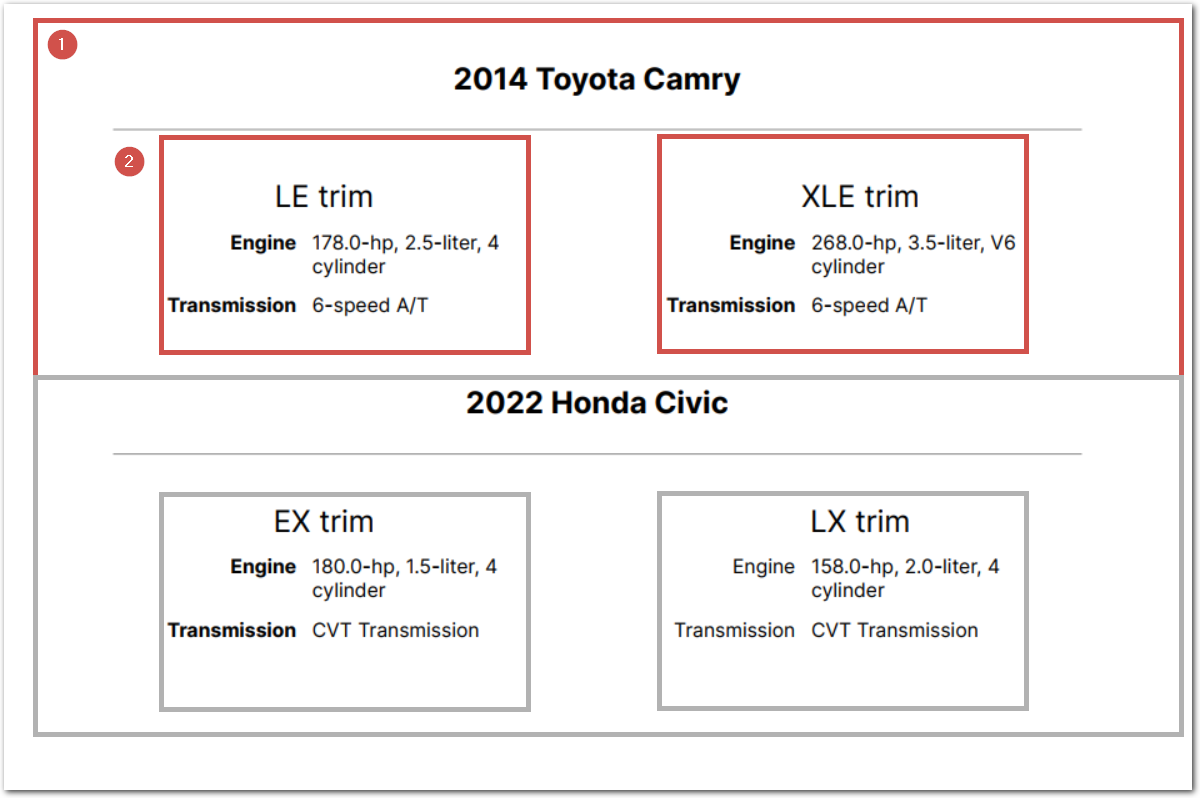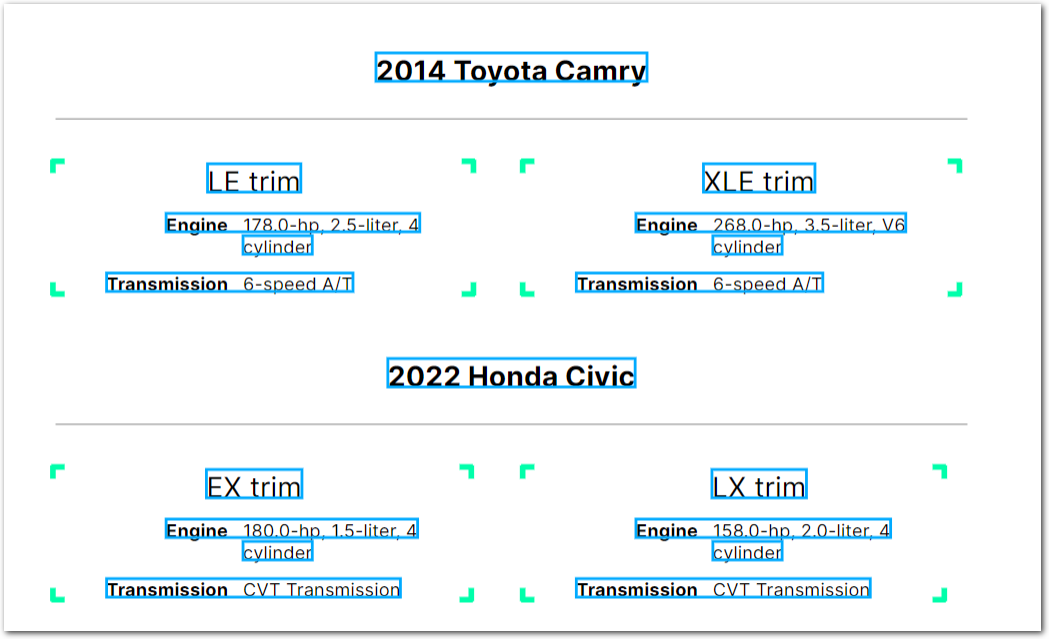Advanced: Table grid example
This example shows:
- Finding repeating vertical sections by nesting them in parent sections.
- Ignoring repeated multiple anchor matches. For more information, see Multiple anchors in section.
Overview
To give a broad overview of using vertical sections for a table grid, see the following image:

In the preceding image, the config uses sections as follows:
-
Defines sections for car models, including their trims.
-
Defines nested vertical sections for car trims.
The following abbreviated YML notation to give a brief idea of the more complex SenseML JSON:
sections:
- id: car_model
range:
anchor: trim
offsetY: -1.1
fields:
- id: car_heading
anchor:
match:
type: first
method:
id: passthrough
sections:
- id: trim_specs
range:
direction: vertical
offsetY: 0.5
minColumnGap: 0.5
anchor:
match:
type: regex
pattern: .+
fields:
- id: trim_name
anchor:
match:
type: first
method:
id: passthrough
- id: engine
anchor: engine
method:
id: row
position: right
With this approach, you can output something like the following, using abbreviated YML notation to give a brief idea of the more complex JSON extraction response:
car_models:
- car_heading: 2014 Toyota Camry
trim_specs:
- trim_name: LE trim
engine: 178.0-hp, 2.5-liter, 4
- trim_name: XLE trim
engine: 268.0-hp, 3.5-liter, V6
- car_heading: 2022 Honda Civic
trim_specs:
- trim_name: EX trim
engine: 180.0-hp, 1.5-liter, 4
- trim_name: LX trim
engine: 158.0-hp, 2.0-liter, 4
Details
The following elaborates on the preceding brief overview using JSON instead of YML. To illustrate each section's range and for troubleshooting purposes, the config includes a field that outputs the entire contents of each section.
Config
{
"preprocessors": [
{
/* merge oversplit lines to enable using passthrough methods */
"type": "mergeLines",
"adjacentThreshold": 0.9,
"directlyAdjacentThreshold": 0.4
}
],
"fields": [
{
"id": "car_models",
"type": "sections",
"range": {
/* uses an offset to include the heading with car model and year */
"offsetY": -1.1,
"anchor": {
"match": {
/* Sensible starts the next section on the first repeated instance of `trim` that
follows the starting line vertically. Sensible ignores repeated `trim` instances
that occur on the same horizontal line as the starting line, so there's no need
to configure requireStop.
*/
"type": "endsWith",
"text": "trim"
}
}
},
"fields": [
{
"id": "car_heading",
"method": {
"id": "passthrough"
},
"anchor": {
"match": {
"type": "first"
}
}
},
{
"id": "everything_in_this_section",
"method": {
"id": "documentRange",
"includeAnchor": true
},
"anchor": {
"match": {
"type": "first"
}
}
},
{
"id": "trim_specs",
"type": "sections",
"range": {
"direction": "vertical",
/* exclude non-columnar headings (for example, "2014 Toyota Camry") so as not to break column recognition.
Sensible recognizes each trim table as one column */
"offsetY": 0.5,
/* use a large minColumnGap so column recognition doesn't break on the whitespace gaps in each trim specs column */
"minColumnGap": 0.5,
"anchor": {
"match": {
/*
Since the parent section group defines the range for the child vertical section group,
you don't need to find specific text matches in the trim spec tables.
Match on all text with ".+"
*/
"type": "regex",
"pattern": ".+"
}
}
},
"fields": [
{
"id": "everything_in_this_nested_section",
"method": {
"id": "documentRange",
"includeAnchor": true
},
"anchor": {
"match": {
"type": "first"
}
}
},
{
"id": "trim_name",
"method": {
"id": "passthrough"
},
"anchor": {
"match": {
"type": "first"
}
}
},
{
"id": "engine",
"method": {
"id": "passthrough",
"wordFilters": [
"engine"
]
},
"anchor": {
"match": {
"type": "startsWith",
"text": "engine",
}
}
}
]
}
]
}
]
}Example document
The following image shows the example document used with this example config:

| Example document | Download link |
|---|
Output
{
"car_models": [
{
"car_heading": {
"type": "string",
"value": "2014 Toyota Camry"
},
"everything_in_this_section": {
"type": "string",
"value": "2014 Toyota Camry LE trim XLE trim Engine 178.0-hp, 2.5-liter, 4 Engine 268.0-hp, 3.5-liter, V6 cylinder cylinder Transmission 6-speed A/T Transmission 6-speed A/T"
},
"trim_specs": [
{
"everything_in_this_nested_section": {
"type": "string",
"value": "LE trim Engine 178.0-hp, 2.5-liter, 4 cylinder Transmission 6-speed A/T"
},
"trim_name": {
"type": "string",
"value": "LE trim"
},
"engine": {
"type": "string",
"value": "178.0-hp, 2.5-liter, 4"
}
},
{
"everything_in_this_nested_section": {
"type": "string",
"value": "XLE trim Engine 268.0-hp, 3.5-liter, V6 cylinder Transmission 6-speed A/T"
},
"trim_name": {
"type": "string",
"value": "XLE trim"
},
"engine": {
"type": "string",
"value": "268.0-hp, 3.5-liter, V6"
}
}
]
},
{
"car_heading": {
"type": "string",
"value": "2022 Honda Civic"
},
"everything_in_this_section": {
"type": "string",
"value": "2022 Honda Civic EX trim LX trim Engine 180.0-hp, 1.5-liter, 4 Engine 158.0-hp, 2.0-liter, 4 cylinder cylinder Transmission CVT Transmission Transmission CVT Transmission"
},
"trim_specs": [
{
"everything_in_this_nested_section": {
"type": "string",
"value": "EX trim Engine 180.0-hp, 1.5-liter, 4 cylinder Transmission CVT Transmission"
},
"trim_name": {
"type": "string",
"value": "EX trim"
},
"engine": {
"type": "string",
"value": "180.0-hp, 1.5-liter, 4"
}
},
{
"everything_in_this_nested_section": {
"type": "string",
"value": "LX trim Engine 158.0-hp, 2.0-liter, 4 cylinder Transmission CVT Transmission"
},
"trim_name": {
"type": "string",
"value": "LX trim"
},
"engine": {
"type": "string",
"value": "158.0-hp, 2.0-liter, 4"
}
}
]
}
]
}Updated 3 months ago